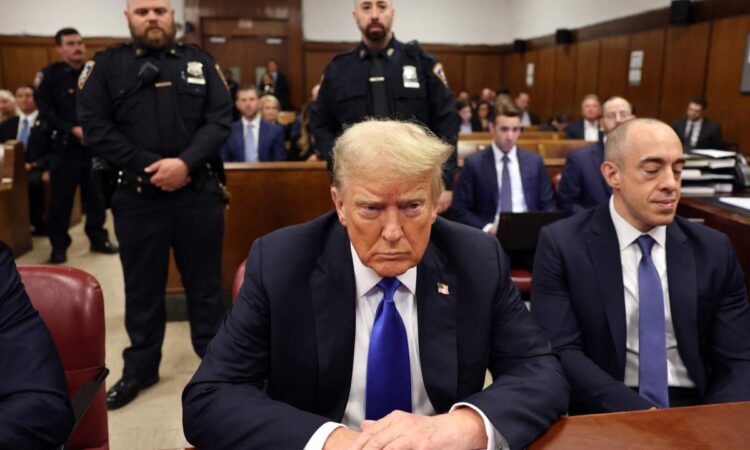
The criminal sentencing of former United States president Donald Trump has been delayed following the Supreme Court ruling to grant presidents immunity from official acts.
A New York judge has postponed the sentencing of former US President Donald Trump over hush money payments to Stormy Daniels until September 16.
The former president pushed for the delay after the Supreme Court’s ruling on immunity.
This comes after the US Supreme Court found former presidents can be immune from criminal prosecution for acts that they took in office.
The 45th president of the United States was originally scheduled to face sentencing on July 11 but the date has now been pushed back to September 18 at the earliest.
US Supreme Court judges ruled on Monday to grant absolute immunity to the commander-in-chief for “official acts” while in the office of the White House.
Former US president Donald Trump has had sentencing for his hush money trial at Manhattan Criminal Court delayed until September. Picture: Michael M. Santiago / Getty Images via AFP
The landmark decision was made by the conservative majority (6-3) on the Supreme Court bench while dissenting progressive judges called the decision “misguided” and a “mockery”.
The consequences of this appear to have already begun as the New York court that tried and convicted Trump has postponed sentencing to interpret how the new ruling affects his case.
In May, Trump became the first US president in history to be found guilty of a criminal offence for payments made to porn star Stormy Daniels and lies associated with the payment.
Porn star Stormy Daniels. Picture: Ethan Miller/Getty Images
However, just hours after the Supreme Court granted “absolute immunity from criminal prosecution”, Trump’s lawyers filed a motion for an urgent delay to review the precedent.
The District Attorney’s office said: “Although we believe (Trump’s) arguments to be without merit, we do not oppose his request for leave.”
Trump’s lawyers have appeared confident and told reporters the Supreme Court ruling “absolutely” impacts the hush money trial.
Falsifying business records, for which Trump was found guilty, has a possible sentence of up to four years in prison but may also be disciplined with probation, fines or conditional discharge.
Trump has faced three other criminal cases, including involvement in the January 6 Capitol riots; conspiring to overturn the election in Georgia; and mishandling classified documents.
Loading embed…
The Supreme Court’s unexpected immunity ruling has enormous impacts on all four criminal cases against the former president.
According to the ruling, the president cannot be prosecuted for “official acts” but prosecutors also cannot submit evidence that relates to any official acts.
There has been speculation evidence including social media posts made while president, phone records and conversations could all be considered official acts.
Trump lawyers said in their submission: “The verdicts in this case violate the presidential immunity doctrine and create grave risks of ‘an Executive Branch that cannibalizes itself’.”






